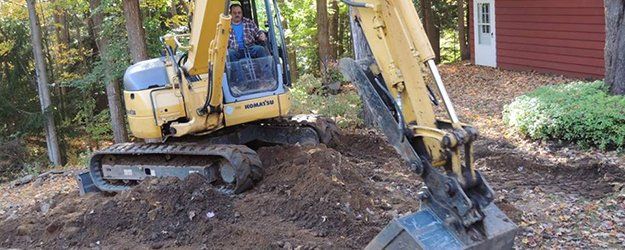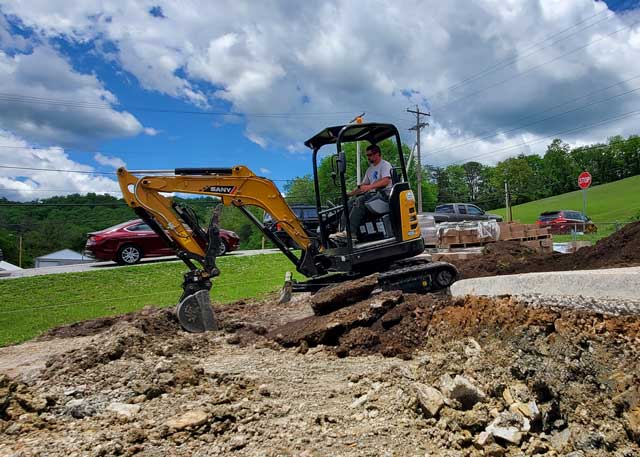Industrial Lancaster Trenching - Trenching Solutions for Companies in Lancaster
Industrial Lancaster Trenching - Trenching Solutions for Companies in Lancaster
Blog Article
Comprehensive Excavation Techniques: Understanding the Basics for Success
The cautious planning, precise execution, and thorough focus to information needed in excavation jobs demand a thorough strategy that includes different essential facets. The real proficiency lies not just in comprehending these basics however in effortlessly integrating them to navigate the intricacies of excavation tasks with skill.
Recognizing Excavation Job Planning

Effective excavation projects are developed on the structure of thorough and thorough preparation. The initial stage of any type of excavation task is the planning phase, where vital choices are made that can substantially impact the result of the task. During this phase, it is important to collect all pertinent info concerning the site, consisting of topographical studies, soil structure, and any kind of prospective dangers that might exist. Understanding the task timeline, scope, and budget restrictions is critical for creating a detailed excavation strategy that makes certain the project's success.
One secret aspect of excavation task preparation is the advancement of a comprehensive timeline that lays out the sequence of tasks, milestones, and due dates. By meticulously thinking about all these elements during the preparation phase, excavation jobs can be carried out effectively and successfully, leading to successful outcomes - lancaster trenching.
Soil Analysis and Website Assessment
Conducting complete dirt analysis and site examination is a crucial action in the prep work stage of any type of excavation task. Dirt analysis involves figuring out the make-up, structure, and buildings of the dirt at the excavation site. This information is vital for understanding the dirt's bearing capacity, moisture content, and capacity for erosion, which are vital variables in figuring out the excavation techniques and equipment required for the job.
Website assessment exceeds soil analysis and incorporates a broader assessment of the total site problems. This analysis consists of identifying any type of possible hazards, such as underground energies, ecological worries, or unstable terrain, that could impact the excavation procedure. By completely evaluating the website, job supervisors can develop reliable excavation strategies that prioritize safety, efficiency, and environmental management.
Making use of innovative innovations like ground-penetrating radar, dirt tasting, and drone surveys can boost the accuracy and efficiency of dirt evaluation and website assessment. Spending time and sources in these preliminary actions can inevitably conserve time and avoid expensive hold-ups or complications during the excavation process.
Equipment Choice and Application
Effective excavation projects count heavily on calculated equipment selection and usage to make certain optimum efficiency and performance. Picking the right equipment for the job is critical in taking full advantage of performance and lessening downtime. Aspects such as the kind of dirt, deepness of excavation, and job extent play a considerable role in identifying one of the most suitable tools for the task available.

Along with selecting the ideal tools, appropriate usage is crucial to task success. Operators has to be educated to take care of the tools securely and effectively - lancaster excavation. Normal upkeep checks and prompt fixings help protect against malfunctions and guarantee consistent efficiency throughout the task
Security Steps and Regulations Compliance
In the realm of excavation jobs, focusing on precaution and compliance with policies is paramount to guaranteeing a lawfully audio and safe functional atmosphere. Safety and security actions include a variety of practices, consisting of conducting comprehensive site analyses, carrying out correct signs and barriers, and providing ample security training for all personnel included in the excavation process. Adherence to laws, such as OSHA demands in the USA, ensures that the excavation task satisfies the required standards to shield employees, onlookers, and the surrounding setting.

Tracking Progression and Adjusting Techniques
How can predict managers efficiently track the development of excavation projects and adjust their methods appropriately to optimize end results? Tracking progress is vital for making certain that excavation tasks remain on track and satisfy due dates. Task managers can utilize various devices and techniques to track progression, such as everyday report card, normal site inspections, and advanced surveillance innovations like drones and GPS tracking systems. By constantly keeping track of the project's innovation, managers can recognize any possible delays or problems early on and take positive actions to address them.

Conclusion
To conclude, understanding the basics of extensive excavation techniques is important for the success of any type of task. By understanding job planning, examining soil and site conditions, picking suitable equipment, abiding with security regulations, and checking progress, project supervisors can make certain a smooth and effective excavation process. his comment is here Implementing these strategies will lead to successful end results and decrease possible threats or problems during the excavation job.
The initial phase of any kind of excavation project is the planning phase, where critical choices are made that can considerably influence the outcome of the project. Recognizing the project range, timeline, and budget restraints is essential for creating a thorough excavation strategy that read the full info here ensures the project's success.
Just how can forecast supervisors effectively track the development of excavation tasks and adjust their approaches appropriately to enhance outcomes? By carefully keeping an eye on progression and being eager to adjust strategies, project managers can enhance the overall success of excavation projects.
By understanding project planning, evaluating soil and site conditions, picking ideal tools, conforming with safety regulations, and keeping track of development, job supervisors can make certain a reliable and smooth excavation process.
Report this page